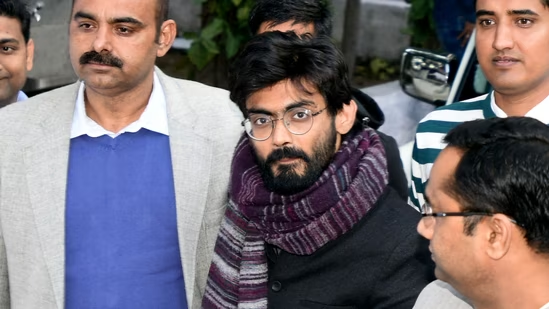
Delhi
New Delhi, September 6, 2025 – Student-activist Sharjeel Imam has escalated his legal battle by moving the Supreme Court, seeking bail in the alleged larger conspiracy case tied to the February 2020 Delhi riots—just days after the Delhi High Court denied his bail plea along with that of eight other co-accused.
The Legal Journey So Far
Imam, held since January 28, 2020, has been in pre-trial detention for over five years. After earlier rejections by trial courts, his case turned to the Delhi High Court, which on September 2, 2025, dismissed his and the bail pleas of Umar Khalid, Athar Khan, Abdul Khalid Saifi, Gulfisha Fatima, Meeran Haider, Shifa Ur Rehman, Mohd Saleem Khan, and Shadab Ahmed .
The High Court ruled that while freedom of speech and protest is constitutionally protected, “conspiratorial violence” cloaked as protest cannot be tolerated. It noted that both Imam and Khalid had played prima facie grave roles in orchestrating unrest through inflammatory speeches and mobilisation efforts .
Key Allegations Against Imam
- The prosecution asserts that the North-East Delhi riots were not spontaneous. Instead, they framed the violence as a well-planned conspiracy with a “sinister motive” aimed at defaming the nation and leveraging international attention.
- Delhi Police and prosecutors have referred to Imam and others as “intellectual architects” behind the riots, citing communications, pamphlet campaigns, and speeches disseminated in the lead-up to the violence .
Sharjeel Imam’s Appeal to the Apex Court
On September 6, 2025, Imam filed a petition in the Supreme Court challenging the Delhi HC’s rejection of his bail plea . His petition argues that his prolonged pre-trial detention is an undue hardship and that the undue delays in judicial proceedings—owing to repeated supplementary charge sheets, extensive digital evidence, and numerous witnesses—should count in his favor.
Imam’s legal team underscores that detaining an undertrial for over five years, especially under the stringent UAPA regime, raises serious constitutional concerns, including violations of the rights to speedy trial, fair hearing, and equality before the law.
What the High Court Said
The division bench of Justices Navin Chawla and Shalinder Kaur underscored that bail cannot be the default when charges appear prima facie true under UAPA, especially given the risk of witness tampering and the gravity of allegations .
The HC also emphasized the cumulative impact of the accused’s actions—creation of WhatsApp groups, pamphleteering, inciteful speeches, and mobilising protests ahead of the riots—as evidence of participation in a larger, orchestrated plan.
Broader Legal and Human Rights Implications
This case highlights a critical clash between state security and individual liberties. The UAPA’s bail restrictions are onerous, making bail exceptionally difficult despite prolonged pre-trial detention.
Imam’s case reflects a larger pattern: many accused—including Gulfisha Fatima—have remained incarcerated for years without trials, drawing critiques from human rights groups alleging arbitrary or vengeful detention.
Moreover, recent judicial developments—including the transfer of judges and the rehearing of arguments in the sprawling UAPA case—signal systemic delays contributing to prolonged legal limbo for the accused .
What Lies Ahead
Imam’s petition is expected to be listed for a hearing soon. The Supreme Court will need to weigh:
- Whether prolonged custody without trial under UAPA is justified by state interests.
- Whether existing safeguards for trial conduct and evidence collection negate the need for pre-trial detention.
- The constitutional imperative of bail as a norm, especially where inordinate delays undermine judicial fairness.
Conclusion
Sharjeel Imam’s Supreme Court move marks a pivotal development in a case at the heart of emotional, political, and legal crossroads in India. It forces a confrontation between security-driven narratives and the inviolable right to liberty and due process. At stake is not just one activist’s freedom, but the judicial system’s balance between protecting society and safeguarding individual rights.
Would you like more insights into the legal framework of UAPA bail norms, comparisons with similar cases, or the Supreme Court’s past bail rulings?
Thanks For Reading